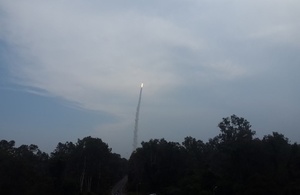Launch success for AlSat Nano
AlSat Nano, a joint CubeSat mission between the UK Space Agency and Algerian Space Agency, has successfully launched from India.

Launch of Alsat Nano cubesat.
Shortly after launch (04:46 BST on Monday 26 September) and orbital injection, Algerian Space Agency operators established contact with the satellite from the Surrey Space Centre (University of Surrey) ground station in Guildford. A series of spacecraft health checks and in orbit commissioning procedures will now follow, with operations then transitioning to Algeria’s newly developed AlSat Nano ground station in Oran.
AlSat Nano is a joint nanosatellite mission between the UK Space Agency and Algerian Space Agency (ASAL). In March 2014 the UK Space Agency and ASAL signed a Memorandum of Understanding (MoU) under which the two parties agreed to enhance collaboration in space programmes. A specific action identified following the MoU was the establishment of a joint educational CubeSat development programme to be delivered by Surrey Space Centre, University of Surrey (SSC), for Algerian graduate students. ASAL has provided the launch, and operations are being undertaken by Algerian operators trained at SSC.
AlSat Nano is Algeria’s first CubeSat mission. The design, build and verification of the AlSat Nano spacecraft has taken place at SSC as a hands-on learning exercise for the students. With dimensions of just 30x10x10cm, yet featuring all the core subsystems of much larger satellites, the programme demonstrates the practical elements of low cost space technology, experience that should help Algeria strengthen its domestic space technology capability.
The spacecraft platform has been built using hardware sourced almost exclusively from UK suppliers, and one third of its volume has been made available to the UK CubeSat community as a free technology demonstration flight opportunity for self-funded payloads, via an open call and competitive selection process. The three payloads are:
C3D2
A highly customisable CubeSat camera suite offering three fields of view and innovative on-board software processing capabilities. The payload will also be a remote experiment of the Open Science Laboratory - a suite of remote experiments that supports distance learning students studying science and engineering. C3D2 will offer these students the chance to operate a real payload on an orbiting spacecraft. The payload development is led by the Open University Centre for Electronic Imaging with sensor hardware provided by e2v Ltd and electronics from XCAM Ltd.
Thin Film Solar Cell
A novel solar cell structure which is directly layered on cover glass just 1/10th of a millimetre thick. Effects from the space environment will be measured, with the aim of allowing the organisations involved a route to product development and commercial exploitation of this technology. This project is led by the Swansea University Centre for Solar Energy Research with contributions from the University of Surrey, Qioptiq Ltd and Surrey Satellite Technology Ltd.
AstroTube Boom
A retractable CubeSat-compatible boom which should be able to deploy up to 1.5 metres in length from a volume around the size of a business card holder. This technology would enable CubeSats to carry out a greater range of science experiments that require sensors to be held as far away from the spacecraft as possible to reduce interference, and could also form the basis of de-orbit systems for future missions. The payload also carries a magnetometer, one of the most compact of its class, to carry out measurements of the Earth’s magnetic field, and RadFET radiation monitors. The payload is led by Oxford Space Systems Ltd, collaborating with partners including the Science and Technology Facilities Councils RAL Space and Bartington Instruments Ltd.
Access to space technology through traditional space missions remains relatively limited for developing nations due to their high cost, but nanosatellite missions offer the possibility to overcome this constraint by providing access at significantly reduced costs. The training and knowledge transfer, delivered by Surrey Space Centre to Algerian students and Algerian Space Agency engineers and satellite operators, is building long term technological capability in a developing space nation.
Alongside the practical elements of the PhD courses, Surrey Space Centre is also delivering specific applied research modules to address some of the developmental issues facing Algeria brought about by its geographical size and natural environment, such as resource management, forest fires, floods, earth quakes, droughts and desertification.
Algerian operators and students will work closely with SSC and the UK payload providers to command the payloads and interpret the data returned for research purposes, and have been closely involved throughout the development programme. These arrangements between mission partners provide the potential for future collaborative opportunities as Algeria develops its domestic space programme, and globally showcase the capability of UK technology in offering low cost solutions for remote sensing and scientific instrumentation.